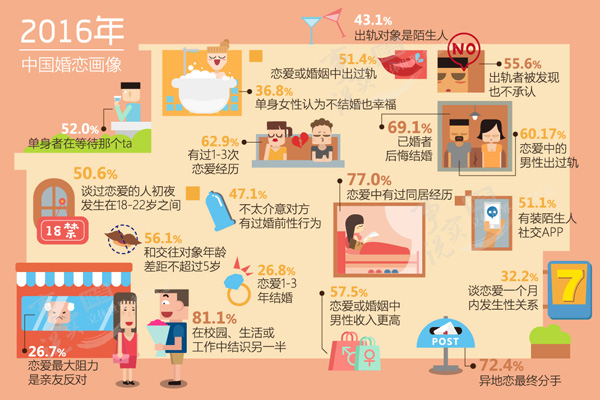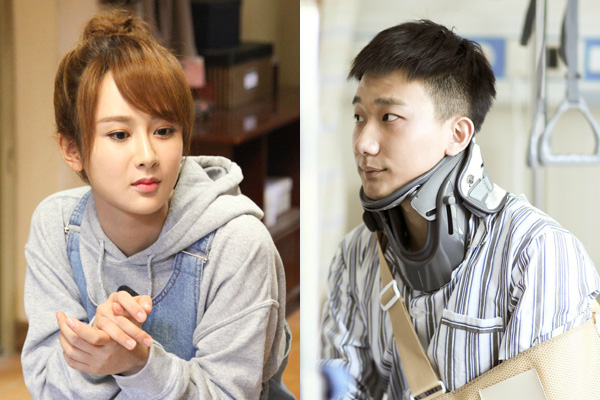Poster of urban TV drama Ode to Joy 2 [Photo provided to chinadaily.com.cn]
Renowned as a Chinese version of Sex and the City, Chinese popular urban drama Ode to Joy returned to the small screen on May 11, its premiere gaining a high viewership rate of 1.34 percent and 1.55 percent on Dragon TV and Zhejiang Satellite TV, respectively.
Ode to Joy mainly follows the story of five young women who live on the same floor in an apartment building, also called "Ode to Joy" in Shanghai city.
The five female protagonists, ranging in age from their mid-20s to early 30s, come from different social and educational backgrounds, but all want a better life both in love and at work. However, things don't always go the way they expect them to.
Romance, careers, friendship and the difficulties women encounter in the metropolis highlight the TV drama.
Twenty-two-year-old Guan Ju'er, for instance, is a diligent young woman with mediocre prospects working at a Top 500 company. As an obedient girl, she is loyal to her friends but has no plan for her future.
Her best friend, Qiu Yingying, only one year older, is a reckless and whimsical woman who is crazy about love. Coming from a small city, she was forced by her parents to stay in Shanghai and make something of herself.
The two young woman share a rented apartment with a 32-year-old woman, Fan Shengmei. Kind-hearted as she is, she always dreams of marrying a rich man and keeping far from her troublesome family business.
Their neighbor is a intelligent and helpful lady named Andy He. As a powerful and decisive overseas returnee, she is not good at dealing with human relationships and her miserable childhood has left a shadow deep in her heart.
The most controversial role in the drama is Qu Xiaoxiao, a 25-year woman who was born into a rich family. She lives a seemingly bright life, but she has to fight against her stepbrother on inheriting the family enterprise and huge wealth.
Despite its popularity the show has drawn many critics who disapprove of too much embedded marketing, disputes in social status differences and controversial moral and social issues in the series.
However, one thing that a majority of viewers agree on is that the down-to-earth TV drama truly reflects the mindset and lifestyle of China's urban middle class, which has experienced tremendous changes over the decades.
Qiu Yingying (left) and Ying Qin [Photo provided to chinadaily.com.cn]
Virgin obsession
In a recent episode of the drama, Qiu Yingying was dumped by her beloved boyfriend ,Ying Qin, a programmer working at an IT company, when he finds out Qiu is not a virgin.
Even as Qiu's friends think of ideas to restore the relationship, Ying turns them down firmly. His mother even says Qiu is not a pure and chaste woman.
Since that episode was released, there's been heated discussion about "virgin obsession" on social media platforms.
Some people think it is ridiculous to talk about virginity in modern society while others think it has something to do with China's traditional culture.
Ying may be a fictional character, but many may agree with his mindset. "As a young man, I think virginity means much to me," says Sina Weibo user Dou Fulun. "We have been told since we were kids that females should value chastity before marriage."
An illustration from the classic book Lessons for Women [Photo/Mtime]
In Chinese traditional culture, women's chastity has been stressed in many classic works. In the Western Han Dynasty (206 BC-AD 24), Biographies for Chaste Women, written by Liu Xiang and Lessons for Women by Ban Zhao all put the emphasis on the importance of the purity of women. In the Qing Dynasty (1644-1911), the chastity of women was praiseworthy in poetry, painting, literature and novels.
But in western civilization, the "virgin complex" does not hold the same position as in China.
During the Renaissance, from the 14th to the 17th centuries, artistic works defied asceticism to sing the praises of love between a man and woman.
An illustration from the classic book The Decameron [Photo/Mtime]
The Decameron, for instance, is a collection of novels by the 14th century Italian author Giovanni Boccaccio (1313–1375). The book is a frame containing 100 tales told by a group of seven young women and three young men sheltering in a secluded villa just outside Florence to escape the Black Death, which was afflicting the city.
In the book, sexual liberation and sexual freedom are at the center of many stories.
While Boccaccio and other authors have written about sexual permissiveness, 'sexual liberation' in the west really didn't come about until the 20th century, especially in the 1960s when the Sexual Revolution began.
Although the attitudes are more relaxed these days, there is still a strong element among some westerners that virginity should be kept until marriage.
It is worthwhile to note that the BBC ran an article, TV Show Triggers Chinese Virginity Debate, to take a close look on the social issue.
According to the BBC, sex education, traditional moral values and double standards on virginity propel the "virgin complex" in China.
"This is not a right or wrong issue. People with different social backgrounds may have opposite attitudes toward virginity," Zhang Chenhua, a professor at Beijing Normal University, "But I personally do not encourage premarital sex."

This illustration shows the results of an online survey, conducted by China's internet giant Tencent in 2016 among 50,000 anonymous users over their outlook on love affairs. [Photo/Official weibo account of From Truth to Report]
In an online survey conducted by China's internet giant Tencent in 2016, among 50,000 anonymous users regarding their outlook on love affairs, only 47.1 respondents said they aren't bothered if their partner has had premarital sex, while more than half of of those polled said they think otherwise.
Also, the survey revealed that 32.2 percent of respondents engaged in sexual activity with their partners within a month after they started dating.





















